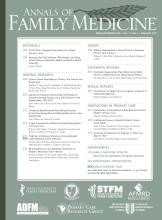Abstract
PURPOSE The purpose of this study was to investigate whether antidepressants are more effective than placebo in the primary care setting, and whether there are differences between substance classes regarding efficacy and acceptability.
METHODS We conducted literature searches in MEDLINE, Embase, Cochrane Central Register of Controlled Trials (CENTRAL), and PsycINFO up to December 2013. Randomized trials in depressed adults treated by primary care physicians were included in the review. We performed both conventional pairwise meta-analysis and network meta-analysis combining direct and indirect evidence. Main outcome measures were response and study discontinuation due to adverse effects.
RESULTS A total of 66 studies with 15,161 patients met the inclusion criteria. In network meta-analysis, tricyclic and tetracyclic antidepressants (TCAs), selective serotonin reuptake inhibitors (SSRIs), a serotonin-noradrenaline reuptake inhibitor (SNRI; venlafaxine), a low-dose serotonin antagonist and reuptake inhibitor (SARI; trazodone) and hypericum extracts were found to be significantly superior to placebo, with estimated odds ratios between 1.69 and 2.03. There were no statistically significant differences between these drug classes. Reversible inhibitors of monoaminoxidase A (rMAO-As) and hypericum extracts were associated with significantly fewer dropouts because of adverse effects compared with TCAs, SSRIs, the SNRI, a noradrenaline reuptake inhibitor (NRI), and noradrenergic and specific serotonergic antidepressant agents (NaSSAs).
CONCLUSIONS Compared with other drugs, TCAs and SSRIs have the most solid evidence base for being effective in the primary care setting, but the effect size compared with placebo is relatively small. Further agents (hypericum, rMAO-As, SNRI, NRI, NaSSAs, SARI) showed some positive results, but limitations of the currently available evidence makes a clear recommendation on their place in clinical practice difficult.
- Received for publication January 30, 2014.
- Revision received May 16, 2014.
- Accepted for publication June 13, 2014.
- © 2015 Annals of Family Medicine, Inc.







